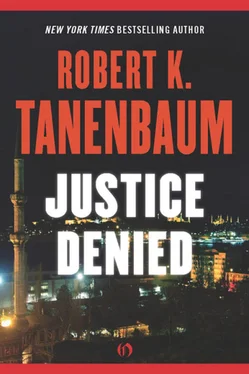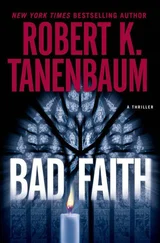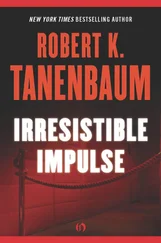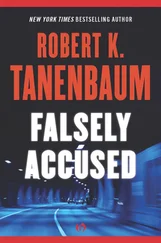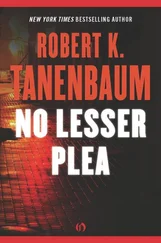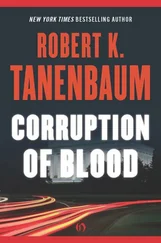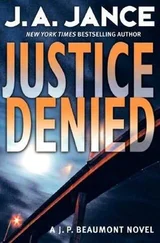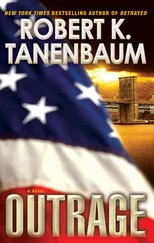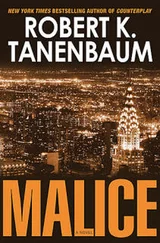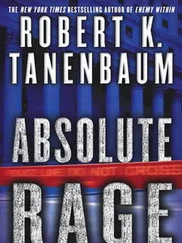Robert Tanenbaum - Justice Denied
Здесь есть возможность читать онлайн «Robert Tanenbaum - Justice Denied» весь текст электронной книги совершенно бесплатно (целиком полную версию без сокращений). В некоторых случаях можно слушать аудио, скачать через торрент в формате fb2 и присутствует краткое содержание. Год выпуска: 2010, Издательство: Open Road Integrated Media, Жанр: Криминальный детектив, на английском языке. Описание произведения, (предисловие) а так же отзывы посетителей доступны на портале библиотеки ЛибКат.
- Название:Justice Denied
- Автор:
- Издательство:Open Road Integrated Media
- Жанр:
- Год:2010
- ISBN:нет данных
- Рейтинг книги:3 / 5. Голосов: 1
-
Избранное:Добавить в избранное
- Отзывы:
-
Ваша оценка:
- 60
- 1
- 2
- 3
- 4
- 5
Justice Denied: краткое содержание, описание и аннотация
Предлагаем к чтению аннотацию, описание, краткое содержание или предисловие (зависит от того, что написал сам автор книги «Justice Denied»). Если вы не нашли необходимую информацию о книге — напишите в комментариях, мы постараемся отыскать её.
Justice Denied — читать онлайн бесплатно полную книгу (весь текст) целиком
Ниже представлен текст книги, разбитый по страницам. Система сохранения места последней прочитанной страницы, позволяет с удобством читать онлайн бесплатно книгу «Justice Denied», без необходимости каждый раз заново искать на чём Вы остановились. Поставьте закладку, и сможете в любой момент перейти на страницу, на которой закончили чтение.
Интервал:
Закладка:
The decorticated mammal exhibits limb extension. The body of Vincent Boguluso did so; the legs stiffened, the arms shot wide, a fleshy crucifix. Squalling, Lucy Karp dropped like a brick.
Marlene was airborne in a low dive. She twisted in the air, her back crashed along the stones, her cupped hands reaching under her falling baby to cushion its skull. She felt the warm weight in her hands and whipped the little body around, pressing it to her breast.
She looked up at the standing corpse. Desperately she started to roll away from it, but there was no need.
The knees buckled, they hit the street, and it fell over slowly onto its side.
“Are you all right?” Harry Bello was kneeling by her side, his face the color of cheap toilet paper.
“Yeah,” said Marlene. She checked the baby. She was still whimpering, and her sundress was torn, but the only marks on her were a thin red bruise on her neck and finger impressions on her arm. Marlene shuddered and tried to force deep breaths into her lungs.
There was a loud, disgusting noise. It went on for some time. Harry looked up.
Marlene said, “It’s okay. He always does that.”
“What, puke his guts?”
Marlene nodded. “When he kills people.”
Harry said nothing. He was pretty sure that if Raney had missed, if he had hit Lucy, Harry would have taken his own gun and killed Vinnie, Raney, and himself, in that order. He put the thought out of his mind and helped Marlene to her feet. Then he went to his car and called the incident in on the police radio.
Karp had slept through the whole thing: the screaming, the shot, the sirens. Raney and Bello said they would handle the clean-up and the various official acts New York considers necessary when one of its citizens has his brains blown over one of its streets. Marlene returned to the loft alone. She got the baby interested in some toys in her playpen and poured herself a tumbler full of red wine. Which she drank and poured another.
There was still dinner to get, she thought, horrific event or no, and, naturally, she had not gone to the store. She was not going to go either. Maybe she would never leave her loft again.
No food in the house. Of course, there is always food in the house. She found half a Spanish onion, some faded escarole, and a chunk of salt pork. There was a bulb of garlic and olive oil.
She gets down an iron pot, splashes in some oil, cuts up the onion, chops in half the garlic and the salt pork, and puts the pieces in the oil, with the gas on low. She doesn’t know what she is going to cook yet, but she knows that it is going to involve garlic and onions.
There was a can of tomatoes and one of tomato paste. Impossible there should not be, in Marlene’s kitchen. She pulls out a handful of dry spaghetti, but sees it is not enough for two and puts it back. She had been going to shop for pasta today.
There is a bag of flour. She gets out her largest pottery bowl and pours a mound of flour into it. She adds water and an envelope of yeast and makes dough. The dough rises, and she scours the back of the refrigerator and comes up with a bag of dried mushrooms and the end of an ancient sausage. She cuts the moldy parts from the sausage. The knife shakes in her hand, and she works slowly.
She opens the can of tomatoes, drains it, and dumps the contents into a steel sieve. She pushes the tomatoes through the sieve into a bowl. The pulp is brighter in color and in texture not very much like Vinnie’s brains blown out across Crosby Street. Nevertheless, vomit rises in her throat, and she has to stop for a moment and lean over the table on her knuckles, breathing, her eyes closed. Then she throws the tomatoes into the pot, adds oregano and bay, covers the pot, and turns the flame down to sharp blue dots.
Karp wakes up and rises, attracted by the sounds and the odors. He comes into the kitchen on one crutch.
“What’d you get?” he asks.
“I didn’t get anything.”
He sees her face. “What happened?” he says in alarm.
She takes a deep breath and tells him. He’s horrified, guilt-stricken. He looks at the child, who is in her playpen, banging two blocks together and crooning to herself.
“She’s fine,” says Marlene. “She’s forgotten it already.”
He senses Marlene doesn’t want to discuss it now. “What’s for dinner, then?” he asks.
“Pizza,” she says.
He is amazed. She amazes him further by pounding out the risen dough and flinging it up in the air. She has done this before, but never for him. A certain ethnic embarrassment: during the summer of her fourteenth year she did it fifty times a day at the restaurant owned by her father’s brother in Belmar, New Jersey. It is obviously something you don’t forget how to do, because Marlene can still do it.
She flings the dough high in the air again and again. Karp and the baby watch this, rapt. The dough enters the realm of pure ballistics, suns and galaxies tug at it. It becomes round and thin. Not a fast food this pizza.
Marlene puts it in a greasy pan and pours her sauce on it, and the mushrooms, escarole, and sausage. She bakes it. They eat, baby Lucy chewing on a crust.
By the time they have finished, Marlene is calm again, but changed, in the way this life has been changing her for some years. Ever less Smith, ever more Sicily.
17
Dropping five stories on a wire was not Karp’s idea of how to start a day when he was on a trial. It did not make him feel like Peter Pan, especially since the belt slipped during the descent and he had to dangle in mid-shaft for a half hour while two employees of the wire factory on the third floor labored, amid loud Spanish controversy, to repair the fault.
When he emerged from the shaft gate, his brow was dark, and his police driver decided not to express any of the several cute remarks he had thought of while observing these events.
Marlene remained in the loft. She had called in sick, although there was nothing physically wrong with her. But if she could not take a mental health day after a weekend during which her child had been assaulted by a gigantic felon, when could she? She spent the morning lounging comfortably in bed, drinking coffee and sharing TV cartoons and cookies with the baby.
Karp passed his morning less pleasantly, finishing up the official witnesses in People v. Russell: Thornby, the arresting officer; Marrano, the cop who had taken the famous blue shirt, the victim’s handbag, and the knife to the station house; Cimella, the detective who had received all this, plus the sales slip found on Russell; and two men from the medical examiner’s office, who established that Susan Weiner had died of stab wounds and that the wounds were consistent with the knife found on the stairway of 58 Barrow, and that the stains on the knife blade were human blood.
The cross went as Karp expected. Freeland pounded away at the time issue. The implication he was trying to plant in the jury’s collective mind was that the cops had found the handbag where the real killer (not Russell) had dumped it, found the sales slip within, and lied that they had found it on the defendant four hours or so before the bag had been located.
At least the trial was moving. Freeland had at last exceeded Judge Martino’s level of tolerance, and Martino had responded in a way that did the defense no good. After a particularly fruitless and time-wasting series of questions about an alternate blood-testing system addressed to the medical examiner’s blood pathologist, a man of magisterial expertise, Martino had called counsel to the bench.
“Mr. Freeland, what is the purpose of this line of questioning?” asked the judge.
“Your Honor, my purpose here is to draw out for the jury the failure of the medical examiner to test for blood type from the stains on the knife purportedly found.”
Читать дальшеИнтервал:
Закладка:
Похожие книги на «Justice Denied»
Представляем Вашему вниманию похожие книги на «Justice Denied» списком для выбора. Мы отобрали схожую по названию и смыслу литературу в надежде предоставить читателям больше вариантов отыскать новые, интересные, ещё непрочитанные произведения.
Обсуждение, отзывы о книге «Justice Denied» и просто собственные мнения читателей. Оставьте ваши комментарии, напишите, что Вы думаете о произведении, его смысле или главных героях. Укажите что конкретно понравилось, а что нет, и почему Вы так считаете.
